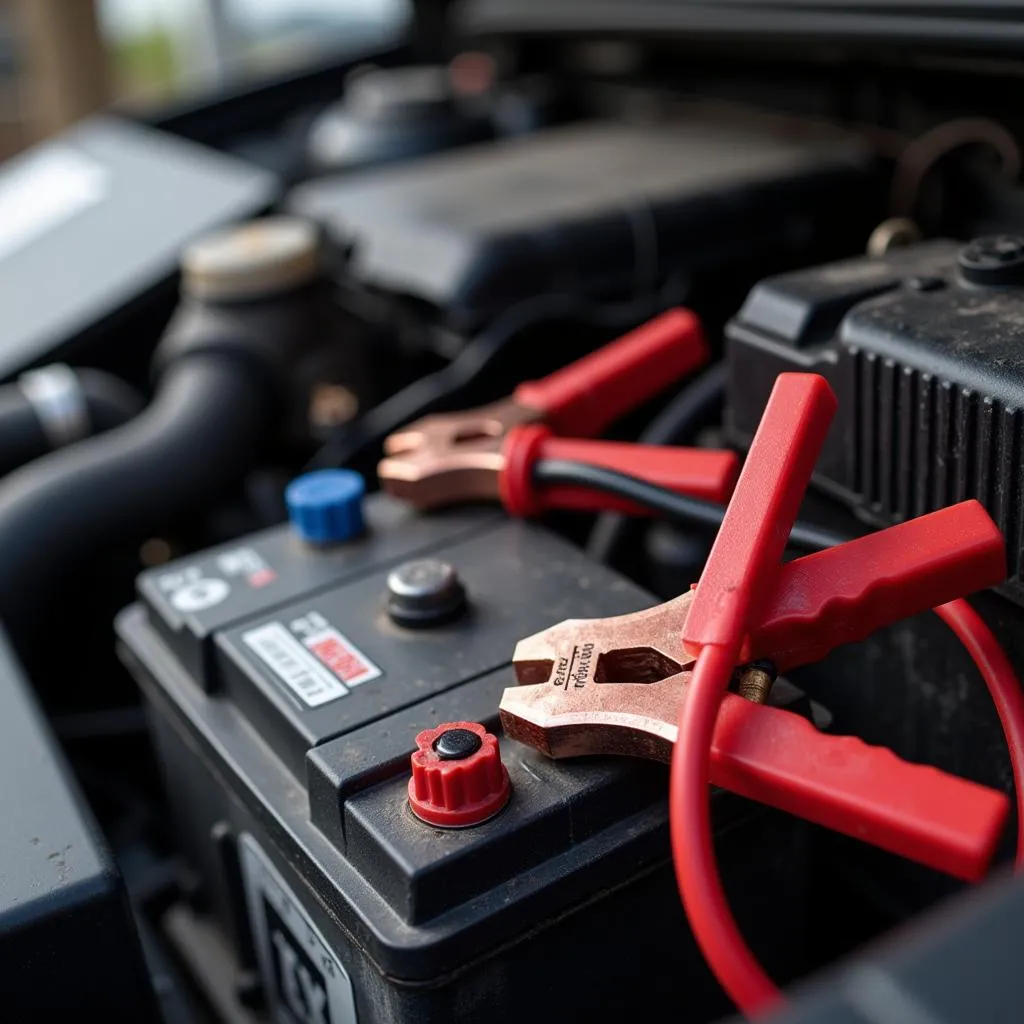Is your car struggling to start, leaving you stranded and frustrated? A car having a hard time starting can be a stressful experience, but understanding the common causes can help you get back on the road faster. This comprehensive guide will walk you through the potential culprits and provide insightful solutions.
Common Reasons Your Car is Having a Hard Time Starting
Several factors can contribute to a car struggling to start, ranging from simple issues like a dead battery to more complex problems within the starter system. Here’s a breakdown of the most common reasons:
1. Dead Battery
A dead battery is the most frequent culprit behind a car that won’t start. If your headlights are dim, the interior lights flicker, or you hear a clicking sound when you turn the key, a dead battery is the likely cause.
What to do: Jumpstart your car using jumper cables and another vehicle or a portable jump starter. If the car starts, have your battery tested and potentially replaced. You can learn more about the difference between a dead battery vs alternator in our dedicated article.
2. Faulty Starter Motor
The starter motor is responsible for cranking the engine to life. A worn-out starter motor might produce a grinding noise when you try to start the car, indicating a need for replacement.
What to do: A mechanic can diagnose a faulty starter motor and advise on the necessary repairs or replacement.
3. Failing Alternator
The alternator recharges the battery and powers the electrical components while the engine is running. If your alternator is faulty, the battery won’t receive a charge, eventually leading to starting problems.
What to do: You can learn more about whether can a bad alternator cause a car not to start in our comprehensive guide. Often, replacing the alternator is the solution.
4. Fuel System Issues
Problems with the fuel pump, fuel filter, or fuel injectors can prevent fuel from reaching the engine, hindering the starting process.
What to do: Have a mechanic inspect your fuel system to identify and address any issues.
5. Ignition System Problems
The ignition system generates the spark that ignites the fuel-air mixture in the engine. A faulty ignition switch, worn spark plugs, or a malfunctioning ignition coil can prevent the engine from starting.
What to do: A mechanic can diagnose and repair ignition system problems. Replacing worn spark plugs can often resolve the issue.
6. Sensor Malfunctions
Modern cars rely on numerous sensors to manage engine functions. A malfunctioning crankshaft position sensor or camshaft position sensor can disrupt the timing of the ignition and fuel systems, preventing the engine from starting.
What to do: Use a bluetooth obd2 sensor or take your car to a mechanic with a professional-grade diagnostic tool like the Bosch Tech 2 to read error codes and pinpoint the faulty sensor.
7. Empty Fuel Tank
It might seem obvious, but sometimes the simplest explanation is the correct one. Ensure you have enough fuel in your tank.
What to do: Refill your fuel tank.
When to Consult a Mechanic
While some starting problems can be resolved with simple DIY fixes, it’s essential to recognize when professional help is necessary. If you experience any of the following, it’s best to consult a qualified mechanic:
- Recurring Starting Problems: If your car frequently struggles to start, it’s crucial to address the underlying issue rather than relying on temporary solutions.
- Unusual Noises: Grinding, clicking, or whining sounds during starting attempts often signal a problem with the starter motor or other components.
- Warning Lights: If your dashboard illuminates warning lights, such as the check engine light, seek professional diagnosis.
- Lack of DIY Expertise: If you’re uncomfortable troubleshooting car problems, it’s always best to leave it to the experts.
Expert Insight
“Many car owners underestimate the importance of regular maintenance,” says John Smith, a seasoned automotive technician with over 20 years of experience. “Simple checks, like inspecting your battery terminals for corrosion or ensuring your fuel filter is clean, can prevent a world of starting troubles down the road.”
Conclusion
A car having a hard time starting can be a frustrating experience, but understanding the common causes empowers you to take action. From simple fixes like jumpstarting a dead battery to seeking professional help for more complex issues, this guide has equipped you with the knowledge to get your car running smoothly again. Remember, regular maintenance and addressing problems promptly are key to preventing future starting difficulties and ensuring a reliable driving experience.
FAQs
1. Can a bad alternator cause a car not to start at all?
Yes, a severely faulty alternator can drain the battery completely, preventing the car from starting.
2. How long do car batteries typically last?
Car batteries typically last 3-5 years, but factors like climate and driving habits can impact their lifespan.
3. If my car starts but then dies, what could be the problem?
This could indicate a fuel delivery issue, a faulty sensor, or a problem with the ignition system.
4. How often should I have my car serviced?
Refer to your owner’s manual for recommended service intervals, but a general guideline is every six months or 5,000 miles.
5. What should I do if my car won’t start and I don’t know what’s wrong?
It’s best to contact a qualified mechanic for diagnosis and repair.
Having further car troubles? Check out these helpful resources:
Need immediate assistance? Contact us!
- WhatsApp: +1(641)206-8880
- Email: cardiagtechworkshop@gmail.com
- Address: 276 Reock St, City of Orange, NJ 07050, United States
Our dedicated customer support team is available 24/7 to assist you.



